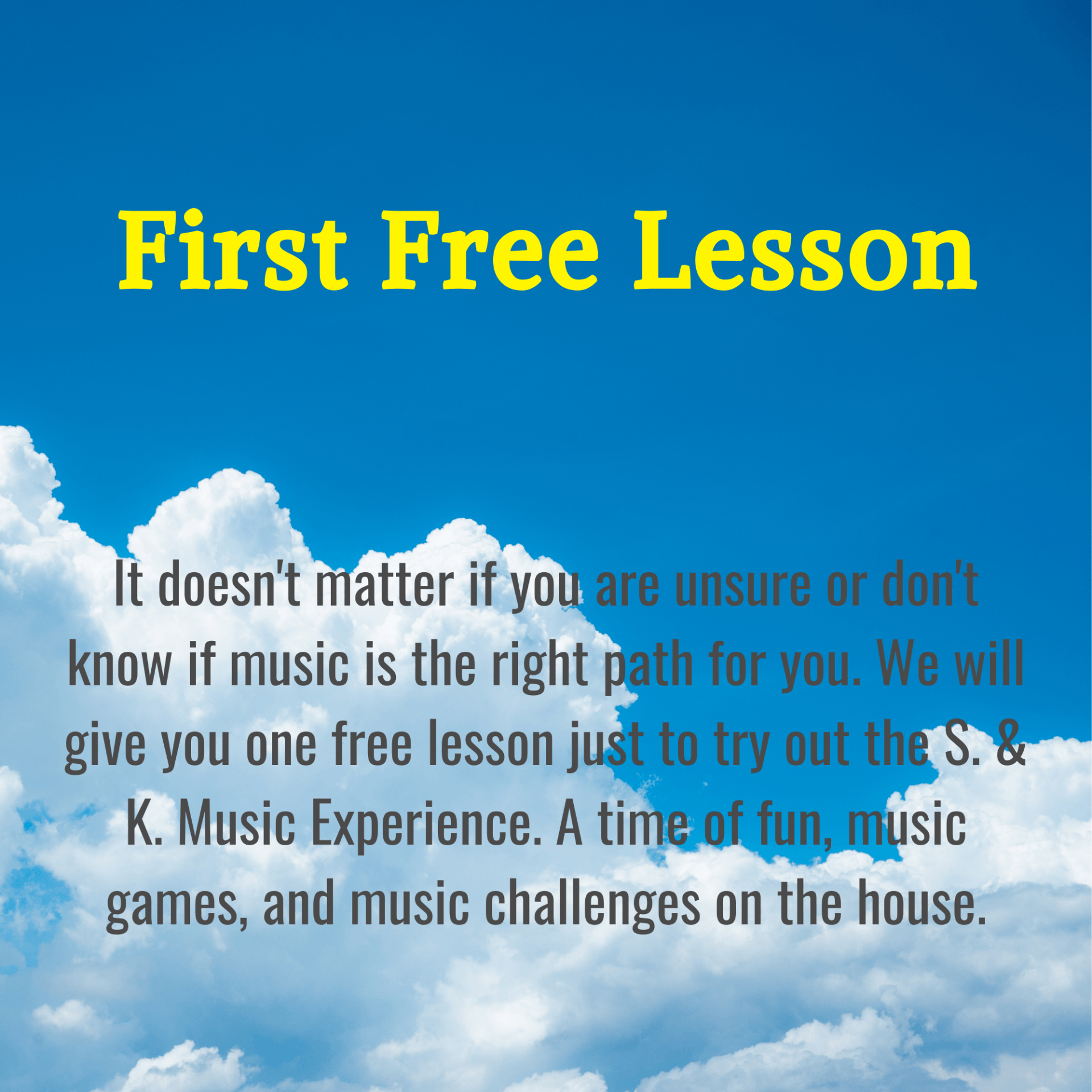
Music Lessons | San Luis Obispo
Our Mission
It is our goal to center music education around fun, motivation, and affordability, help students embrace their diversity through tailored music lessons to fit the needs of unique students, develop highly proficient musicians that also excel in their academics, sociality, and emotional intelligence through musicology learning, highly influence our students’ lives by having devoted music teachers that will encourage our students to understand through any trials of life there are always
“Bright Days with Music”.
Offered Lesson Plans
View Our Instagram
-
Check out S & K music lessons in YouTube to learn more about music!!!!! 🎶🕹️🎥😊 https://www.youtube.com/channel/UC1PYz3vVn56mcMrtHMkiB3Q?sub_confirmation=1 #musicteacher #musiclessonsforkids #youtubekids #sanluisobispocaliforniaButton
-
Sorry for the scream! But we’re at the 500 club!!!!! ♥️♥️♥️♥️ Thank you so much everyone♥️♥️ #youtube #musiclessons #musiclessonsforkids #sanluisobispocaliforniaButton
-
Teacher @shai_butnot_shy had an awesome Idea for her Sticky Wall! Now it’s also Sticky window! 🪟☀️ #musicteacher #slocal #sanluisobispo #musicloverButton
-
MEET C Scale! 🐟 and learn about the C5 Scale. Watch our new Video in our YouTube Channel @SKmusiclessons to encourage music in your family Click the link on our profile description to go to the video. #musicteacher #slocal #sanluisobispocounty #slomom #pianoteacher #musictheory #musiclessons #musiclessonsforkids #fungames #youtubevideos #youtubekidsButton
-
Tune in to our annual Livestream Concert with more than 90 awesome students performing 🎶 ☀️ #slomusic #sanluisobispocalifornia #musiclessons #musicproductionButton
-
Discover the magic of your voice with our empowering voice lessons. 🎤🎶 Unlock your full potential and let your voice shine! #VoiceLessons #SingWithPassion #SAndKMusic #music #love #art #musician #artist #musica #instagood #singer #instagram #follow #rock #like #dance #guitar #s #photography #song #bhfyp #newmusic #life #party #fashion #explorepage #viral #beats #shineonlineButton
-
Success doesn't wait; it comes to those who take the first step towards their dreams. 🌟🚶♂️ #FirstStepToSuccess #SAndKMusic #music #love #art #musician #artist #musica #instagood #singer #instagram #follow #rock #like #dance #guitar #s #photography #song #bhfyp #newmusic #life #party #fashion #explorepage #viral #beats #shineonlineButton
-
Listening and playing music benefits toddlers and infants of all ages in many different ways. In our Baby and Me Class, we will teach expecting parents and parents with babies how to incorporate music in their child’s daily lives. #SAndKMusic #music #love #art #musician #artist #musica #instagood #singer #instagram #follow #rock #like #dance #guitar #s #photography #song #bhfyp #newmusic #life #party #fashion #explorepage #viral #beats #shineonlineButton
-
Take the first step towards creating beautiful tunes and melodies that resonate with your soul. Join us for a trial lesson and let the music in you flourish! 🎶✨ Enroll now and let the music play. 🎵 #SAndKMusic #music #love #art #musician #artist #musica #instagood #singer #instagram #follow #rock #like #dance #guitar #s #photography #song #bhfyp #newmusic #life #party #fashion #explorepage #viral #beats #shineonlineButton
-
Hmm, what do you think? Comment below with your answer!✨ #SAndKMusic #music #love #art #musician #artist #musica #instagood #singer #instagram #follow #rock #like #dance #guitar #s #photography #song #bhfyp #newmusic #life #party #fashion #explorepage #viral #beats #shineonlineButton
-
Kickstart the Week with Melodic Joy! 🎉 Mondays = Fun Days! 🎶 Dive into Music, Enroll in Our Lessons, and Set the Tone for an Awesome Week Ahead. 🎵 #SAndKMusic #music #love #art #musician #artist #musica #instagood #singer #instagram #follow #rock #like #dance #guitar #s #photography #song #bhfyp #newmusic #life #party #fashion #explorepage #viral #beats #shineonlineButton
-
Hit the Right Note 🎶: Elevate Your Musical Skills! 🎵 Enroll in our Music Lessons for a Harmonious Journey. 🎼 #SAndKMusic #music #love #art #musician #artist #musica #instagood #singer #instagram #follow #rock #like #dance #guitar #s #photography #song #bhfyp #newmusic #life #party #fashion #explorepage #viral #beats #shineonlineButton
-
🎹 Unlock the Melodic Magic: Piano-Keyboard Lessons for Kids 🌟🎶 Ignite your child's musical journey with piano lessons! From playful key taps to beautiful melodies, we guide young fingers towards a world of musical wonders. Let's compose their musical dreams together! 🎵✨ #SAndKMusic #music #love #art #musician #artist #musica #instagood #singer #instagram #follow #rock #like #dance #guitar #s #photography #song #bhfyp #newmusic #life #party #fashion #explorepage #viral #beats #shineonlineButton
-
Encouraging a consistent practice routine involves making practice enjoyable and rewarding. Set achievable goals, offer positive reinforcement, incorporate fun games and activities related to music, and celebrate their progress. Creating a supportive and nurturing environment will motivate your child to practice regularly. #SAndKMusic #music #love #art #musician #artist #musica #instagood #singer #instagram #follow #rock #like #dance #guitar #s #photography #song #bhfyp #newmusic #life #party #fashion #explorepage #viral #beats #shineonlineButton
-
Your music journey matters to us! 🎶✨ Share your experience and help others discover the magic of our music lessons. Leave a review on Google and let your voice be the beat of our success! #SAndKMusic #music #love #art #musician #artist #musica #instagood #singer #instagram #follow #rock #like #dance #guitar #s #photography #song #bhfyp #newmusic #life #party #fashion #explorepage #viral #beats #shineonlineButton
-
Let the rhythm of your creativity be your guiding melody. 🎶✨ Stay inspired. Never stop creating. 🎵💫 #SAndKMusic #music #love #art #musician #artist #musica #instagood #singer #instagram #follow #rock #like #dance #guitar #s #photography #song #bhfyp #newmusic #life #party #fashion #explorepage #viral #beats #shineonlineButton
-
Unleash your musical talent with our dynamic trio - Flax, Ken & Shai! 🎶🎸 Join our online music lessons and let the melodies flow. 🌟✨ #SAndKMusic #music #love #art #musician #artist #musica #instagood #singer #instagram #follow #rock #like #dance #guitar #s #photography #song #bhfyp #newmusic #life #party #fashion #explorepage #viral #beats #shineonlineButton
-
🌟 Music lessons that hit all the right notes! Join us and let's create beautiful music together. 🎶🎵 #SAndKMusic #music #love #art #musician #artist #musica #instagood #singer #instagram #follow #rock #like #dance #guitar #s #photography #song #bhfyp #newmusic #life #party #fashion #explorepage #viral #beats #shineonlineButton
-
Unlock your musical potential with us! 🎶 Join our music lessons and let the melodies of your dreams come alive. 🎵🎸 #SAndKMusic #music #love #art #musician #artist #musica #instagood #singer #instagram #rock #like #dance #song #bhfyp #newmusic #beats #shineonlineButton
-
Stay focused on the things that you love. #SAndKMusic #music #love #art #musician #artist #musica #instagood #singer #instagram #follow #rock #like #dance #guitar #s #photography #song #bhfyp #newmusic #life #party #fashion #explorepage #viral #beats #shineonlineButton
-
If you work hard every day then today you deserve a break. Warm wishes on Labor Day. #SAndKMusic #music #love #art #musician #artist #musica #instagood #singer #instagram #follow #rock #like #dance #guitar #s #photography #song #bhfyp #newmusic #life #party #LaborDay #explorepage #viral #beats #shineonlineButton
-
Enroll your kids now in our guitar lesson. Visit our website for more information. www.sandkmusic.com You can contact us now: 📞:+1 805-503-5722 🌐: www.SandKmusic.com #SAndKMusic #music #love #art #musician #artist #musica #instagood #singer #instagram #follow #rock #like #dance #guitar #s #photography #song #bhfyp #newmusic #life #party #fashion #explorepage #viral #beats #shineonlineButton
-
Have a great month ahead, everyone. Fall is coming. Enroll your kids now! #SAndKMusic #music #love #art #musician #artist #musica #drums #keyboard #drums #voicelesson #instagood #singer #instagram #follow #rock #like #dance #guitar #s #photography #song #bhfyp #newmusic #life #party #fashion #explorepage #viral #beats #shineonlineButton
-
Our Ukulele instructors will be sure to keep the fun of learning music by encouraging students to find songs they love and learn through those songs instead of assigned songs. #SAndKMusic #music #love #art #musician #artist #musica #instagood #singer #instagram #follow #rock #like #dance #guitar #s #photography #song #bhfyp #newmusic #life #party #fashion #explorepage #viral #beats #shineonlineButton
-
Take one step toward the dream of your child by enrolling now in our music lesson. #SAndKMusic #music #love #art #musician #artist #musica #instagood #singer #instagram #follow #rock #like #dance #guitar #s #photography #song #bhfyp #newmusic #life #party #fashion #explorepage #viral #beats #shineonlineButton
-
In our voice lessons program students will learn how their speaking voice highly influences their singing voice. Enroll now! #SAndKMusic #music #love #art #musician #artist #musica #instagood #singer #instagram #follow #rock #like #dance #guitar #s #photography #song #bhfyp #newmusic #life #party #fashion #explorepage #viral #beats #shineonlineButton
-
Have a great week ahead, everyone! Check out our lessons and enroll now. #SAndKMusic #music #love #art #musician #artist #musica #drums #keyboard #drums #voicelesson #instagood #singer #instagram #follow #rock #like #dance #guitar #s #photography #song #bhfyp #newmusic #life #party #fashion #explorepage #viral #beatsButton
-
Learning a musical instrument is challenging, it demands fine motor skills and coordination. It develops children's listening, thinking skills, imagination and perseverance. It brings out the very best in the children as they work collaboratively with their peers and teachers. -Sheila Hancock #SAndKMusic #music #love #art #musician #artist #musica #instagood #singer #instagram #follow #rock #like #dance #guitar #s #photography #song #bhfyp #newmusic #life #party #fashion #explorepage #viral #beats #shineonlineButton
-
Do you wish to learn all the instruments in the world? Then, start by playing the piano! Dubbed the king of all instruments for having the whole orchestra at the tips of your fingers. #SAndKMusic #music #love #art #musician #artist #musica #instagood #singer #instagram #follow #rock #like #dance #guitar #s #photography #song #bhfyp #newmusic #life #party #fashion #explorepage #viral #beats #shineonlineButton
-
It’s August! It's time to enroll in our programs. You can contact us now: 📞:+1 805-503-5722 🌐: www.SandKmusic.com #SAndKMusic #music #love #art #musician #artist #musica #instagood #singer #instagram #follow #rock #like #dance #guitar #s #photography #song #bhfyp #newmusic #life #party #fashion #explorepage #viral #beats #shineonlineButton
-
It enables us to concentrate and do our work better. Music escalates our efficiency and accuracy. #SAndKMusic #music #love #art #musician #artist #musica #instagood #singer #instagram #follow #rock #like #dance #guitar #s #photography #song #bhfyp #newmusic #life #party #fashion #explorepage #viral #beats #shineonlineButton
-
Today is the perfect day to start chasing a dream. #SAndKMusic #music #love #art #musician #artist #musica #instagood #singer #instagram #follow #rock #like #dance #guitar #s #photography #song #bhfyp #newmusic #life #party #fashion #explorepage #viral #beatsButton
-
At S. & K. Music Lessons, students will travel through the examination of themselves, their emotions, their environment, and their health with the practice of Wholistic Singing with their Voice Coach. Enroll now! #SAndKMusic #music #love #art #musician #artist #musica #instagood #singer #instagram #follow #rock #like #dance #guitar #s #photography #song #bhfyp #newmusic #life #party #fashion #explorepage #viral #beats #805BusinessButton
-
Drum Lessons are perfect for anyone with lots of energy! Playing the drums provides a great physical outlet while also sharpening mental acuity. Enroll now! #SAndKMusic #music #love #art #musician #artist #musica #instagood #singer #instagram #follow #rock #like #dance #guitar #s #photography #song #bhfyp #newmusic #life #party #fashion #explorepage #viral #beats #805BusinessButton
-
Do you have more than one child? Then this class might be the best for you. S. & K. Music Lessons Sibling classes offer fun and affordable alternatives for Families with more than one child. Here, brothers and sisters can learn to bond by jamming together in their own family music band. 👯♀️ #SAndKMusic #music #love #art #musician #artist #musica #instagood #singer #instagram #follow #rock #like #dance #guitar #s #photography #song #bhfyp #newmusic #life #party #fashion #explorepage #viral #beatsButton
-
"Musicians want to be the loud voice for so many quiet hearts." - Billy Joel #SAndKMusic #music #love #art #musician #artist #musica #instagood #singer #instagram #follow #rock #like #dance #guitar #s #photography #song #bhfyp #newmusic #life #party #fashion #explorepage #viral #beats #805BusinessButton
-
Live your life with good music. You know what's more good? Enrolling your kid in our lessons, and we will help them discover their talents. #SAndKMusic #music #love #art #musician #artist #musica #instagood #singer #instagram #follow #rock #like #dance #guitar #s #photography #song #bhfyp #newmusic #life #party #fashion #explorepage #viral #beats #shineonlineButton
-
You want your kids to have fun this summer. Enroll them now! You can contact us now: 📞:+1 805-503-5722 🌐:sandkmusic.com #SAndKMusic #music #love #art #musician #artist #musica #instagood #singer #instagram #follow #rock #like #dance #guitar #s #photography #song #bhfyp #newmusic #life #party #fashion #explorepage #viral #beats #shineonlineButton
-
The bass is not always “heard” as much as it is “felt” since the low frequencies it creates can shake the earth. Our bass instructors teach theory and reading skills, as well as practical performance skills & improvisation. visit our website now! www.sandkmusic.com #SAndKMusic #music #love #art #musician #artist #musica #instagood #singer #instagram #follow #rock #like #dance #guitar #s #photography #song #bhfyp #newmusic #life #party #fashion #explorepage #viral #beats #805BusinessButton
-
Enroll to our voice lesson classes weekly 60 mins long. Interested in our music lessons? Visit our website:sandkmusic.com #SAndKMusic #music #love #art #musician #artist #musica #instagood #singer #instagram #follow #rock #like #dance #guitar #s #photography #song #bhfyp #newmusic #life #party #fashion #explorepage #viral #beats #805BusinessButton
-
Children are like flowers. Let them bloom by giving them your warm smiles, your soft gentle words falling on them like rain and your art of confidence. You will be amazed at your own garden. #SAndKMusic #music #love #art #musician #artist #musica #instagood #singer #instagram #follow #rock #like #dance #guitar #s #photography #song #bhfyp #newmusic #life #party #fashion #explorepage #viral #beats #ShineonlineButton
-
Happy Father's Day to the greatest dad in the world! Read more at: https://www.bqprime.com/trending/bqc-celebrating-fathers-day-short-messages-quotes-and-captions-to-honor-dads Copyright © BQ Prime #SAndKMusic #music #love #art #musician #artist #musica #instagood #singer #instagram #follow #rock #like #dance #guitar #s #photography #song #bhfyp #newmusic #life #party #fashion #explorepage #viral #beats #ShineonlineButton
-
If not, this is your chance! Contact us and enroll your kids now, and have a bright day with music! #SAndKMusic #music #love #art #musician #artist #musica #instagood #singer #instagram #follow #rock #like #dance #guitar #s #photography #song #bhfyp #newmusic #life #party #fashion #explorepage #viral #beats #ShineonlineButton
-
Did you know that music can heal your mind? Here are some facts! #SAndKMusic #music #love #art #musician #artist #musica #instagood #singer #instagram #follow #rock #like #dance #guitar #s #photography #song #bhfyp #newmusic #life #party #fashion #explorepage #viral #beats #ShineonlineButton
-
Hmmm, drums or guitar? Comment your answer down below, and let's see if the majority is a guitar or drums person. #SAndKMusic #music #love #art #musician #artist #musica #instagood #singer #instagram #follow #rock #like #dance #guitar #s #photography #song #bhfyp #newmusic #life #party #fashion #explorepage #viral #beats #ShineonlineButton
-
Ready for summer? Enroll Now! Make your summer memorable with us. Our team will be glad to welcome you to your summer lessons and help you learn with new friends. #SAndKMusic #music #love #art #musician #artist #musica #instagood #singer #instagram #follow #rock #like #dance #guitar #s #photography #song #bhfyp #newmusic #life #party #fashion #explorepage #viral #beats #ShineOnlineButton
-
Did you know that music has a lot of benefits for your body? Here are some of the benefits. #SAndKMusic #music #love #art #musician #artist #musica #instagood #singer #instagram #follow #rock #like #dance #guitar #s #photography #song #bhfyp #newmusic #life #party #fashion #explorepage #viral #beats #shineonlineButton
-
Music can relax your mind and offer you a perfect channel to focus on a topic. You will also feel detached from the world and float in a world of your own where you feel comfortable. #SAndKMusic #music #love #art #musician #artist #musica #instagood #singer #instagram #follow #rock #like #dance #guitar #s #photography #song #bhfyp #newmusic #life #party #fashion #explorepage #viral #beats #shineonlineButton
-
Land of the free, because of the brave. Thank you for your sacrifice. #SAndKMusic #music #love #art #musician #artist #musica #instagood #singer #instagram #follow #rock #like #dance #guitar #s #photography #song #bhfyp #newmusic #life #party #fashion #explorepage #viral #beats #shineonlineButton
-
Musicology is the analysis and research of Music Science. Part of Musicology is to understand through scientific experiments and observations how Music affects the Brain. S. & K. Music Lessons prides itself by applying the experimental results of musicology research into our teaching methods. #SAndKMusic #music #love #art #musician #artist #musica #instagood #singer #instagram #follow #rock #like #dance #guitar #s #photography #song #bhfyp #newmusic #life #party #fashion #explorepage #viral #beats #shineonlineButton
-
Live your life with good music. You know what's more good? Enrolling your kid in our lessons, and we will help them discover their talents. #SAndKMusic #music #love #art #musician #artist #musica #instagood #singer #instagram #follow #rock #like #dance #guitar #s #photography #song #bhfyp #newmusic #life #party #fashion #explorepage #viral #beats #shineonlineButton
-
Childhood is short. Moms are forever. Happy Mother's day!❤️ #SAndKMusic #music #love #art #musician #artist #musica #instagood #singer #instagram #follow #rock #like #dance #guitar #s #photography #song #bhfyp #newmusic #life #party #fashion #explorepage #viral #beats #shineonlineButton
-
Enroll to our instrument classes weekly 60 mins long. Pick the right music class for you! Interested in our music lessons? Visit our website:sandkmusic.com #SAndKMusic #music #love #art #musician #artist #musica #instagood #singer #instagram #follow #rock #like #dance #guitar #s #photography #song #bhfyp #newmusic #life #party #fashion #explorepage #viral #beats #805BusinessButton
-
Enroll now! If you want to contact us and enroll in one of our music lessons, contact us now on our website by filling up the form on our website. Lessons: -Piano\Keyboard -Voice -Guitar -Drums -Bass -Ukulele #SAndKMusic #music #love #art #musician #artist #musica #instagood #singer #instagram #follow #rock #like #dance #guitar #s #photography #song #bhfyp #newmusic #life #party #fashion #explorepage #viral #beats #805BusinessButton
-
If you are looking for the nearest music lesson for your kids, call us now! 📞:+1 805-503-5722 We are located at Santa Rosa St., San Luis Obispo, CA. #SAndKMusic #music #love #art #musician #artist #musica #instagood #singer #instagram #follow #rock #like #dance #guitar #s #photography #song #bhfyp #newmusic #life #party #fashion #explorepage #viral #beats #805BusinessButton
-
Summer is almost here! Enroll your kids in music lessons and enjoy their summer learning and making new friends. #SAndKMusic #music #love #art #musician #artist #musica #instagood #singer #instagram #follow #rock #like #dance #guitar #s #photography #song #bhfyp #newmusic #life #party #fashion #explorepage #viral #beats #805BusinessButton
-
Do you want the load and fun or the relaxing vibes? Comment down below your answer! #SAndKMusic #music #love #art #musician #artist #musica #drums #keyboard #drums #voicelesson #instagood #singer #instagram #follow #rock #like #dance #guitar #s #photography #song #bhfyp #newmusic #life #party #fashion #explorepage #viral #beatsButton
-
Are you dreaming of becoming a performer and located near Lawton Ave.? Check out our lessons and enroll now. #SAndKMusic #music #love #art #musician #artist #musica #drums #keyboard #drums #voicelesson #instagood #singer #instagram #follow #rock #like #dance #guitar #s #photography #song #bhfyp #newmusic #life #party #fashion #explorepage #viral #beatsButton
-
The Ukulele is a perfect instrument for anybody starting out with String Instruments. In our Ukulele lessons, learn how to play chords, read music lead sheets, Ukulele tabs, and music theory. Also apply fine to gross motor skills improvement into finger muscles for strumming, picking, and chord formations. Enroll now! #SAndKMusic #music #love #art #musician #artist #musica #drums #keyboard #drums #voicelesson #instagood #singer #instagram #follow #rock #like #dance #guitar #s #photography #song #bhfyp #newmusic #life #party #fashion #explorepage #viral #beatsButton
-
The Bass is an instrument of fundamental importance. Bass notes sit on the bottom of the “Sound Pyramid” and support all of the melody and harmony being created by the other instruments in the band. The bass is not always “heard” as much as it is “felt” since the low frequencies it creates can shake the earth. Our bass instructors teach theory and reading skills, as well as practical performance skills & improvisation. #SAndKMusic #music #love #art #musician #artist #musica #drums #keyboard #drums #voicelesson #instagood #singer #instagram #follow #rock #like #dance #guitar #s #photography #song #bhfyp #newmusic #life #party #fashion #explorepage #viral #beatsButton
-
Share some funny jokes down below and share this dad joke with your friends. #SAndKMusic #music #love #art #musician #artist #musica #instagood #singer #instagram #follow #rock #like #dance #guitar #s #photography #song #bhfyp #newmusic #life #party #fashion #explorepage #viral #beatsButton
-
The Bass is an instrument of fundamental importance. Bass notes sit on the bottom of the “Sound Pyramid” and support all of the melody and harmony being created by the other instruments in the band. The bass is not always “heard” as much as it is “felt” since the low frequencies it creates can shake the earth. Our bass instructors teach theory and reading skills, as well as practical performance skills & improvisation. #SAndKMusic #music #love #art #musician #artist #musica #instagood #singer #instagram #follow #rock #like #dance #guitar #s #photography #song #bhfyp #newmusic #life #party #fashion #explorepage #viral #beatsButton
-
To pick the right service for yourself or your child, we must apply each students’ age, attention span, and other key factors to pick the right structure that will make music fun and successful. So, Call us to book your Free Consultation to find out how music private lessons could apply to you or your child.✨🥁 📞:+1 805-503-5722 #SAndKMusic #music #love #art #musician #artist #musica #instagood #singer #instagram #follow #rock #like #dance #guitar #s #photography #song #bhfyp #newmusic #life #party #fashion #explorepage #viral #beatsButton
-
Just like music follow your own rhythm. if you wanna learn music enroll now! #SAndKMusic #music #love #art #musician #artist #musica #instagood #singer #instagram #follow #rock #like #dance #guitar #s #photography #song #bhfyp #newmusic #life #party #fashion #explorepage #viral #beats #instruments #enrollButton
-
Do you wish to learn all the instruments in the world? Then, start by playing the piano! Dubbed the king of all instruments for having the whole orchestra at the tips of your fingers. #SAndKMusic #music #love #art #musician #artist #musica #instagood #singer #instagram #follow #rock #like #dance #guitar #s #photography #song #bhfyp #newmusic #life #party #fashion #explorepage #viral #beats #instruments #enrollButton
-
The Ukulele is a perfect instrument for anybody starting out with String Instruments. In our Ukulele lessons, learn how to play chords, read music lead sheets, Ukulele tabs, and music theory. Also apply fine to gross motor skills improvement into finger muscles for strumming, picking, and chord formations. #SAndKMusic #music #love #art #musician #artist #musica #instagood #singer #instagram #follow #rock #like #dance #guitar #s #photography #song #bhfyp #newmusic #life #party #fashion #explorepage #viral #beats #instruments #enrollButton
-
At S. & K. Music Lessons, students will travel through the examination of themselves, their emotions, their environment, and their health with the practice of Wholistic Singing with their Voice Coach. Being named one of the most complex instruments, the voice is not just made up of breath and vocal cords.🎤🎼 #SAndKMusic #music #love #art #musician #artist #musica #instagood #singer #instagram #follow #rock #like #dance #guitar #s #photography #song #bhfyp #newmusic #life #party #fashion #explorepage #viral #beats #instruments #enrollButton
-
Reminder: you got this It will all work out. enroll now to our Music Lesson! #SAndKMusic #music #love #art #musician #artist #musica #instagood #singer #instagram #follow #rock #like #dance #guitar #s #photography #song #bhfyp #newmusic #life #party #fashion #explorepage #viral #beats #instruments #enrollButton
-
Drum Lessons are perfect for anyone with lots of energy! Playing the drums provides a great physical outlet while also sharpening mental acuity. Drums (along with the human voice) are one of the most ancient instruments and have been with us for thousands of years in the form of storytelling, dance ceremonies, as well as recreation. #SAndKMusic #music #love #art #musician #artist #musica #instagood #singer #instagram #follow #rock #like #dance #guitar #s #photography #song #bhfyp #newmusic #life #party #fashion #explorepage #viral #beats #instruments #enrollButton
-
Do you want your kids to learn different instruments? Call us now for more details. 📞:+1 805-503-5722 #SAndKMusic #music #love #art #musician #artist #musica #instagood #singer #instagram #follow #rock #like #dance #guitar #s #photography #song #bhfyp #newmusic #life #party #fashion #explorepage #viral #beats #instruments #enrollButton
-
Be that change. Start with yourself! If you wish to change the world, start with yourself!✨ #SAndKMusic #music #love #art #musician #artist #musica #instagood #singer #instagram #follow #rock #like #dance #guitar #s #photography #song #bhfyp #newmusic #life #party #fashion #explorepage #viral #beats #805BusinessButton
-
Enroll your kid now in one of our music lessons. Make your kid one of the best. #SAndKMusic #music #love #art #musician #artist #musica #instagood #singer #instagram #follow #rock #like #dance #guitar #s #photography #song #bhfyp #newmusic #life #party #fashion #explorepage #viral #beatsButton
-
With Teacher Shaira and Teacher Kenneth’s vast knowledge of music, education, and musicology, their music school grew to the business that it is today. You can also expect that for many more years to come, S. & K. Music Lessons will keep bringing “Bright Days with Music” to all and uphold the benefits of music to infants, toddlers, teenagers, and adults all over the Central Coast. #SAndKMusic #music #love #art #musician #artist #musica #instagood #singer #instagram #follow #rock #like #dance #guitar #s #photography #song #bhfyp #newmusic #life #party #fashion #explorepage #viral #beatsButton
-
Who's ready to load music with friends? S. & K. Music Lessons offers a variety of classes that are COVID-compliant. Enroll now! #SAndKMusic #music #love #art #musician #artist #musica #instagood #singer #instagram #follow #rock #like #dance #guitar #s #photography #song #bhfyp #newmusic #life #party #fashion #explorepage #viral #beatsButton
-
Happy President’s Day! “The harder the conflict, the greater the triumph.” – George Washington #SAndKMusic #music #love #art #musician #artist #musica #instagood #singer #instagram #follow #rock #like #dance #guitar #s #photography #song #bhfyp #newmusic #life #party #fashion #explorepage #viral #beats #805BusinessButton
-
Get the chance to sing and learn with us! Let's have a blast in S. & K. Music Lessons! Lessons: ➡Piano / Keyboard ➡Guitar ➡Bass ➡Ukulele ➡Vocal ➡Drums #SAndKMusic #music #love #art #musician #artist #musica #instagood #singer #instagram #follow #rock #like #dance #guitar #s #photography #song #bhfyp #newmusic #life #party #fashion #explorepage #viral #beats #805BusinessButton
-
Meet new friends while learning music, here in S&K, you will get both fun and knowledge!🥁 #SAndKMusic #music #love #art #musician #artist #musica #instagood #singer #instagram #follow #rock #like #dance #guitar #s #photography #song #bhfyp #newmusic #life #party #fashion #explorepage #viral #beats #805BusinessButton
-
Meet our team. Our teachers and our canine support! Our teachers, who have great experience with music, and Flax, whose career goals are to earn lots of treats and continue to have many "Bark Days with Music,". “Bright Days with Music” #SAndKMusic #music #love #art #musician #artist #musica #instagood #singer #instagram #follow #rock #like #dance #guitar #s #photography #song #bhfyp #newmusic #life #party #fashion #explorepage #viral #beats #805BusinessButton
-
Enroll your children now in music lessons! #SAndKMusic #music #quote #love #art #musician #artist #musica #instagood #singer #instagram #follow #rock #like #dance #guitar #s #photography #song #bhfyp #newmusic #life #party #fashion #explorepage #viral #beats #805BusinessButton
-
Start your music lesson as early as possible! Enroll your children now to siblings class🎼🥁 #SAndKMusic #music #love #art #musician #artist #musica #instagood #singer #instagram #follow #rock #like #dance #guitar #s #photography #song #bhfyp #newmusic #life #party #fashion #explorepage #viral #beats #805BusinessButton
-
Do you have more than one child? Then this class might be the best for you. S. & K. Music Lessons Sibling classes offer fun and affordable alternatives for Families with more than one child. #SAndKMusic #music #love #art #musician #artist #musica #instagood #singer #instagram #follow #rock #like #dance #guitar #s #photography #song #bhfyp #newmusic #life #party #fashion #explorepage #viral #beats #805BusinessButton
-
We accept private lessons, online lessons, group lessons, sibling classes, and baby and me lessons. We want the best for you, for faster learning. #SAndKMusic #music #love #art #musician #artist #musica #instagood #singer #instagram #follow #rock #like #dance #guitar #s #photography #song #bhfyp #newmusic #life #party #fashion #explorepage #viral #beats #805BusinessButton
-
The Guitar is an impressively versatile instrument. You can carry it on your back if you want to go out busking or hike to the beach to jam with friends, & at the same time can be seen played with any style in almost any context. It can be used to play chords that you can sing with or plugged in to an amp to create radically unique sounds and textures which bring a lot of style and flavor to musical acts around the world. #SAndKMusic #music #love #art #musician #artist #musica #instagood #singer #instagram #follow #rock #like #dance #guitar #s #photography #song #bhfyp #newmusic #life #party #fashion #explorepage #viral #beats #805BusinessButton
-
It is our goal to center music education around fun, motivation, and affordability, help students embrace their diversity through tailored music lessons to fit the needs of unique students, develop highly proficient musicians that also excel in their academics, sociality, and emotional intelligence through musicology learning, highly influence our students’ lives by having devoted music teachers that will encourage our students to understand through any trials of life there are always “Bright Days with Music”. #SAndKMusic #music #love #art #musician #artist #musica #instagood #singer #instagram #follow #rock #like #dance #guitar #s #photography #song #bhfyp #newmusic #life #party #fashion #explorepage #viral #beats #805BusinessButton
-
Which lessen did you take and how was your experiences? Comment down below! #SAndKMusic #music #love #art #musician #artist #musica #instagood #singer #instagram #follow #rock #like #dance #guitar #s #photography #song #bhfyp #newmusic #life #party #fashion #explorepage #viral #beats #805BusinessButton
-
Looking for someone that you can trust when it comes to your child? Good thing you read this! We are 100% sure that after our lesson, your child will learn a lot. #SAndKMusic #music #love #art #musician #artist #musica #instagood #singer #instagram #follow #rock #like #dance #guitar #s #photography #song #bhfyp #newmusic #life #party #fashion #explorepage #viral #beats #805BusinessButton
-
Drum Lessons are perfect for anyone with lots of energy! Playing the drums provides a great physical outlet while also sharpening mental acuity. Drums (along with the human voice) are one of the most ancient instruments and have been with us for thousands of years in the form of storytelling, dance ceremonies, as well as recreation. It is a great instrument for young learners because the initial technique required to play is very quick and easy to develop and helps to build a foundation for any other musical studies. #SAndKMusic #music #love #art #musician #artist #musica #instagood #singer #instagram #follow #rock #like #dance #guitar #s #photography #song #bhfyp #newmusic #life #party #fashion #explorepage #viral #beats #805BusinessButton
-
Instead of a new year, new me. Why not a new year, new talent? Enroll your child now and discover new talents! #SAndKMusic #music #love #art #musician #artist #musica #instagood #singer #instagram #follow #rock #like #dance #guitar #s #photography #song #bhfyp #newmusic #life #party #fashion #explorepage #viral #beats #805BusinessButton
-
sandkmusic3It's best to expose your children to things they might enjoy in the future as early as possible. This lesson not only teaches them how to play instruments but also helps them build their character. #SAndKMusic #reminder #music #love #art #musician #artist #musica #instagood #singer #instagram #follow #rock #like #dance #guitar #s #photography #song #bhfyp #newmusic #life #party #fashion #explorepage #viral #beats #805BusinessButton
-
It is our goal to center music education around fun, motivation, and affordability, help students embrace their diversity through tailored music lessons to fit the needs of unique students, develop highly proficient musicians that also excel in their academics, sociality, and emotional intelligence through musicology learning, highly influence our students’ lives by having devoted music teachers that will encourage our students to understand through any trials of life there are always. #SAndKMusic #reminder #music #love #art #musician #artist #musica #instagood #singer #instagram #follow #rock #like #dance #guitar #s #photography #song #bhfyp #newmusic #life #party #fashion #explorepage #viral #beats #805BusinessButton
-
It's hot chocolate weather. Merry Christmas, everyone, and enjoy the holidays with your family!🎄 #SAndKMusic #reminder #music #love #art #musician #artist #musica #instagood #singer #instagram #follow #rock #like #dance #guitar #s #photography #song #bhfyp #newmusic #life #party #fashion #explorepage #viral #beats #805BusinessButton
-
What instruments do your kids want to play? Learn more by enrolling in one of our music lessons.🎼🥁🎸🎻🎹 #SAndKMusic #reminder #music #love #art #musician #artist #musica #instagood #singer #instagram #follow #rock #like #dance #guitar #s #photography #song #bhfyp #newmusic #life #party #fashion #explorepage #viral #beats #805BusinessButton
-
We would love to hear some feedback from you. Share with us your experience by leaving a Google review!🥁 #SAndKMusic #reminder #music #love #art #musician #artist #musica #instagood #singer #instagram #follow #rock #like #dance #guitar #s #photography #song #bhfyp #newmusic #life #party #fashion #explorepage #viral #beats #805BusinessButton
-
Have a happy weekend, everyone! What's your plan? Instead of spending the next weekend without learning anything, try one of our music lessons for your kid to enjoy the weekend. #SAndKMusic #reminder #music #love #art #musician #artist #musica #instagood #singer #instagram #follow #rock #like #dance #guitar #s #photography #song #bhfyp #newmusic #life #party #fashion #explorepage #viral #beats #805BusinessButton
-
Lil fun Lil project for our Lil waiting students 🎄🎁🖍️💛Button
-
The importance of music cannot be underestimated. It can transport us, transform us and allow us to express ourselves in ways that might be otherwise difficult. #SAndKMusic #reminder #music #love #art #musician #artist #musica #instagood #singer #instagram #follow #rock #like #dance #guitar #s #photography #song #bhfyp #newmusic #life #party #fashion #explorepage #viral #beats #805BusinessButton
-
Do you wish to learn all the instruments in the world? Then, start by playing the piano! Dubbed the king of all instruments for having the whole orchestra at the tips of your fingers. #SAndKMusic #reminder #music #love #art #musician #artist #musica #instagood #singer #instagram #follow #rock #like #dance #guitar #s #photography #song #bhfyp #newmusic #life #party #fashion #explorepage #viral #beats #805BusinessButton
-
Drum Lessons are perfect for anyone with lots of energy! Playing the drums provides a great physical outlet while also sharpening mental acuity. Enroll now and visit our website to learn more about our music lessons. #SAndKMusic #reminder #music #love #art #musician #artist #musica #instagood #singer #instagram #follow #rock #like #dance #guitar #s #photography #song #bhfyp #newmusic #life #party #fashion #explorepage #viral #beats #805BusinessButton
-
Awesome job to all of our performers for the Heritage Livestream Concert! We are so proud of you!!!Button
-
At S. & K. Music Lessons, students will travel through the examination of themselves, their emotions, their environment, and their health with the practice of Wholistic Singing with their Voice Coach. #SAndKMusic #reminder #music #love #art #musician #artist #musica #instagood #singer #instagram #follow #rock #like #dance #guitar #s #photography #song #bhfyp #newmusic #life #party #fashion #explorepage #viral #beats #805BusinessButton
Why Music



With Teacher Shaira and Teacher Kenneth’s vast knowledge of music, education, and musicology, their music school grew to the business that it is today. You can also expect that for many more years to come, S. & K. Music Lessons will keep bringing “Bright Days with Music” to all and uphold the benefits of music to infants, toddlers, teenagers, and adults all over the Central Coast.
(805) 503 5722


Sarah Spindel
Google Review









































































































